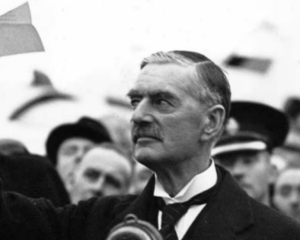On the 1st September, 1939, Hitler invaded Poland. Britain and France sent Germany an ultimatum.
在1939年9月1日,希特勒入侵波蘭。英國和法國向德國發出最后通牒。
This morning, the British Ambassador in Berlin handed the German government a final note,
今晨,在柏林的英國駐德大使向德國政府遞交了最后一份照會,
stating that unless we heard from them by eleven o'clock that they were prepared at once to withdraw their troops from Poland, a state of war would exist between us.
聲明如果德方在十一時前不表態立即從波蘭撤軍,英德兩國將進入戰爭狀態。
I have to tell you now that no such undertaking has been received, and that consequently, this country is at war with Germany.
我現在必須告訴各位我們沒有收到這樣的承諾,因此我國與德國已經處于戰爭狀態。
Neville Chamberlain's mournful voice announced the war as if lamenting the death of a maiden aunt. The evacuation of children began.
內維爾·張伯倫用悲傷的語調宣戰,就像為和平的天真唱挽歌。孩子們開始疏散。
None of this meant for a minute that Chamberlain was going to hand the reins over to Churchill.
但這并不意味著張伯倫將把權柄移交給丘吉爾。
For all that his dark prophecies seemed to be coming true, Churchill was still mistrusted by the vast majority of his party.
雖然丘吉爾的悲觀預言不幸言中,黨內多數同僚依然不信任他。
But the swing in public opinion towards him had been so great, it seemed prudent to include him in the government.
但是民意大幅度倒向他,因此將他攬入內閣更顯慎重。
And on the day the war was declared, Churchill was given his old job back as First Lord of the Admiralty.
在宣戰的那一天,丘吉爾官復原職,重任海軍大臣。
But, as if in a rerun of Gallipoli, Churchill's first big campaign ended in disaster when his attempt to cut off Germany's iron ore supplies through Norway backfired horribly.
但他的第一場戰役,猶如加里波利悲劇的重演,丘吉爾意圖阻斷德國通過挪威獲取鐵礦,不幸失策。
Somehow Churchill escaped the blame for the fiasco in Norway. Whatever the problems, his energy and resolution made it seem as though he at least was doing his best.
總之丘吉爾避開了在挪威慘敗的指責。不論出現了什么問題,他的能量和決策都讓人覺得他在竭盡全力。

Next to Neville Chamberlain -- gaunt, weary, presiding over a front bench of old geezers -- Churchill, though an old geezer himself, seemed like a red hot volcano, a lava flow of plans and strategies.
內維爾·張伯倫臉上盡是憔悴,萎靡,主持著前排議席的老家伙們,而在一旁的丘吉爾雖然也是個老家伙,看起來卻更像個發紅發熱的火山,身體里流淌著計策和謀略。
Confidence in Chamberlain, meanwhile, was at an all-time low, and on 10th May, 1940, he was finally forced to resign.
與此同時,對張伯倫的信任已降到歷史最低,在1940年5月10日,他最終被迫辭職。
The weeks that followed were the most important in Britain's long history.
在那之后的幾個星期在英國的歷史長河中舉足輕重。
Two vital questions were at stake -- who would follow Chamberlain as Prime Minister, and how would he deal with the Nazi war machine?
兩個生死攸關的問題迫在眉睫,誰將在張伯倫之后接任首相,而他又會怎樣對付納粹這個戰爭機器?
Not only the survival of our national independence, but that of western democracy, would turn on the outcome.
這不僅關乎我們國家的存亡,連西方民主的存亡也仰仗于此。
Two kinds of men, two kinds of England, were in play for the leadership of the country.
兩個不同的人,兩個不同的英國,開始爭奪起這個國家的領導權。
In the man everyone expected to take over, Lord Halifax, was the England of the counties -- solid, sensible, a good egg and a cool head.
哈利法克斯勛爵眾望所歸,他擁有英國紳士的一切良好品質,可靠、理智、討人喜歡并頭腦冷靜。
And then there was Winston, who was none of these things.
而另一個候選者溫斯頓,完全不具備上述任何品質。
But in the best judgement of his life, Halifax turned the job down. In the pit of his stomach, he knew he didn't have what it took to be a war leader.
但放棄這份工作是哈利法克斯一生最明智的決定。他打心底里清楚,他沒有成為一個戰時領袖的潛質。
Winston had seen the face of battle, Halifax had only hunted foxes.
溫斯頓已經見識過戰場的真實面目,哈利法克斯卻只獵殺過狐貍。












